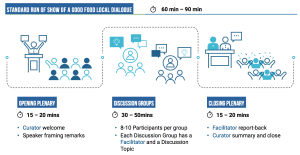How to Convene a Local Dialogue
Anyone with an interest in ending hunger, improving nutritional outcomes, and reducing diet-related diseases can convene a Local Dialogue.
Local Dialogues provide diverse stakeholders with opportunities to participate in food systems change and help inform the conversations happening around national and global policy efforts to address our greatest food challenges, like the White House Conference on Hunger (Sept. 28, 2022); COP27 (Nov. 7 – 18, 2022); and the next Farm Bill.
Step-by-Step Guide to Scheduling a Local Dialogue
For those interested in convening a Local Dialogue, we have a step-by-step guide on how to get started.
Local Dialogue Roles
Local Dialogues use a standardized approach to ensure each of the conversations, although unique, use the same framework to guide the discussion. Each Local Dialogue is comprised of conveners, curators, facilitators, and participants.
Convener
The Local Dialogue convener is responsible for the planning, organization, and execution of a Local Dialogue, as well as submitting the Official Feedback Form to the Good Food Dialogues website, following the discussion.
Conveners ensure that:
- an integrated, interdisciplinary, and exploratory approach is adopted to shape pathways to sustainable food systems;
- all aspects – from preparation, planning, execution, and reporting – embrace the Good Food Dialogues Principles of Engagement;
- a diverse set of stakeholder groups are invited to participate in the Local Dialogue;
- the participants who join the Local Dialogue have a range of profiles and experience; and
- special consideration is given to engaging stakeholder groups historically underrepresented in discussions about the future of food systems.
Convener Resources
- Good Food Dialogues Reference Manual
- Orientation and Training Videos
- Step-by-step guide to convening a Local Dialogue
- Excel Planning Spreadsheet
- Attendance Register
- Social Media Toolkit
Curator
The Local Dialogue curator is identified and appointed by the convener. The curator is responsible for preparing, planning, and moderating a Local Dialogue, as well as ensuring the Dialogue contributes to informing the White Conference on Hunger, Nutrition, and Health. If you are selected as a curator, we encourage you to familiarize yourself with the relevant sections of the Good Food Dialogues Reference Manual and training videos and remain in close contact with the convener to support the event preparation.
The curator should have a good understanding of the Local Dialogue topics; an appreciation of hunger, nutrition, and health in the United States; and familiarity with at least some of the stakeholder groups who will participate. Curators should also have experience engaging multiple stakeholders with different perspectives; encouraging exploration of complex challenges using systems thinking; establishing convergence and recognizing irreconcilable differences; and weaving co-owned outcomes in an inclusive and open way.
Curators’ tasks include:
- preparing for the Local Dialogue with the convener;
- presiding over and moderating the event (welcoming participants, introducing high-level guests and explaining the focus and expected outcome of the Dialogue);
- encouraging continued exchanges among the participants.
- summarizing the outcomes from different Discussions Groups, if break-out groups are used; and
- assisting the convener in completing the Official Dialogue Feedback form.
Facilitator
Appointed by the curator, dialogue facilitators are responsible for ensuring that each participant in the Local Dialogue has an opportunity to contribute equally, meaningfully and have their perspectives listened to by others. If using break-out discussion groups, the facilitator ensures that each break-out group addresses the discussion topics and prompts and is responsible for reporting key takeaways from the discussion to the convener and curator. Depending on the number of participants, the facilitator may benefit from the appointment of a note-taker.
If you would like to be a facilitator but have not been invited by a curator or convener, you can explore upcoming Local Dialogues posted on our website and connect with dialogue conveners who have their contact information listed to offer your skills as a facilitator.
Facilitators’ tasks include:
- reading and understanding the resource materials provided by the curator;
- arriving at the discussion venue or joining the virtual discussion platform before participants to greet and welcome them;
- encouraging participants to introduce themselves to each other;
- explaining to participants what’s expected of them during the discussion;
- observing participants during the discussion to ensure a safe space;
- keeping the discussion moving forward in a timely manner;
- stimulating exchanges, as necessary; and curbing those who are dominating;
- keeping group members focused, inclusive, and empathetic;
completing the facilitator discussion group form; and - reporting back to the curator on the themes discussed in break-out discussion groups.
Participant
Local Dialogue participants are expected to listen to each other and be open to the co-existence of divergent points of view. Participants are invited to Local Dialogues by the convener or, if registration is open, conveners can be contacted directly through their dialogue event page (visit Explore Local Dialogues).
To foster robust discussion, Local Dialogues should include a wide range of stakeholders and points of view. This could mean including professionals working in direct service organizations, urban farmers, directly impacted individuals, healthcare providers, and many more. Participants can be from small, medium and large enterprises, community organizations, universities, schools, and more, and should include members of different stakeholder groups including women, youth, indigenous peoples, and immigrants.
Local Dialogues are carefully curated and facilitated to help participants explore convergences and differences. By the end of the Local Dialogue, participants will have identified the practices and policies that will have the greatest impact on strengthening both their local food systems, as well as the national approach to food policy.
Participants should come prepared to:
- listen to each other;
- welcome diverse perspectives;
- seek out new connections;
- explore both synergy and divergence within the conversation;
- collaborate to identify promising courses of action for reducing hunger and malnutrition; and
- debate the potential impacts of different strategies.
Prior to the date of the scheduled dialogue, participants are also asked to complete an attendance form and submit it to the dialogue convener.

